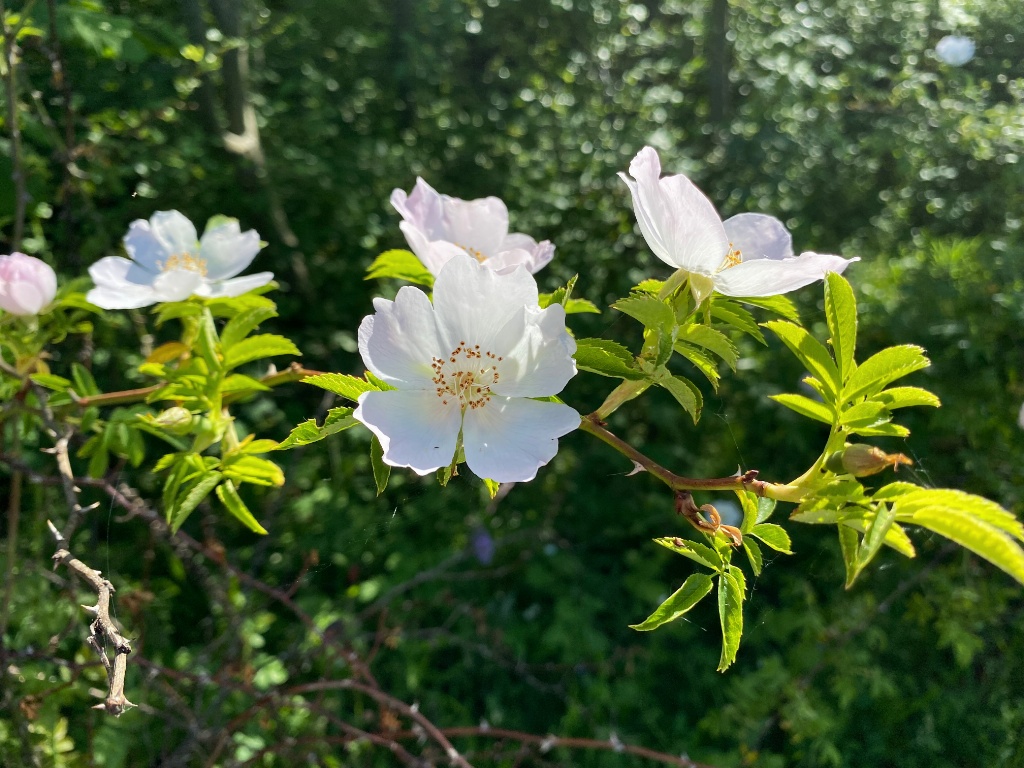Wild roses in the wood down the road.
Quote of the Day
”Aristotle once said that a play should have a beginning, a middle and an end. But what did he know? Today, a play must have a first half, a second half, and a station break.”
- Alfred Hitchcock
Musical alternative to the morning’s radio news Scott Joplin | The Entertainer | Richard Smith
First time I’ve heard a guitar version.
Long Read of the Day
Where is the Political Economy?
by Angela P. Harris, Amy Kapczynski and Noah Zatz
Long, sobering, scholarly and perceptive.
Neoliberal rhetoric portrays the economy as a self-regulating machine that begins to malfunction when the state “intervenes,” disrupting the internal mechanisms that would otherwise yield good and efficient results. LPE scholars, building on previous critical legal work, argue instead that markets are created and maintained by state law and are embedded in political institutions and social norms. Turning to prescription, we often call for “democratizing” the economy—as in the LPE Project’s recent conference, “Democracy Beyond Neoliberalism.” But what, and where, is the economy that we should be democratizing?
Embracing the terms “economy” and “political economy,” as LPE has done, risks—unless we are careful—invoking just the kind of separate, reified realm that we are trying to critique. In our view, defining “the economy,” and studying how legal institutions have done so, should be central issues that LPE scholarship aims to address.
The Law and Political Economy (LPE) project is one of the most interesting things going on in academia at the moment.
Apple thought it could ‘manage’ China: big mistake
Salutary dose of realism from Jack Nicas.
Mr. Guthrie’s career arc and evolving view of China tell the story of Western industry’s complicated dance with the country over the past three decades. Mr. Guthrie and many executives, politicians and academics had bet that Western investment in China would lead the country to liberalize. It is now clear that they miscalculated.
“We were wrong,” said Mr. Guthrie, who left Apple in 2019. “The wild card was Xi Jinping.”
This is a useful primer on the history of Apple’s involvement in China. Mr Nicas told the story in more depth on an edition of the NYT’s The Daily podcast.
It only takes one bit of data…
Quentin’s salutary, not to say creepy, tale:
A few days ago, I created a new Facebook account. Not for myself, of course; I’m not stupid! (I deleted my own account many years ago and haven’t looked back.) No, it was because my company was writing some software that connected to Instagram, and doing that requires you to have a Facebook account in order to get ‘Developer’ access and for testing.
So, I set up a new email address and registered with a somewhat fake name, logged in and started browsing a generic here-are-some-feeds-you-might-be-interested-in type of experience. No personal details… all nice and anonymous.
The following day, I couldn’t log in. “Your account has been blocked.” Had I been rumbled? Ah, no, they just wanted to check I was really a real human by sending a text to my phone. I put in my phone number, got the text, filled in the code, and I was back in again. Jolly good. I logged out and went back to work.
A few days later…
The following Tuesday I logged in again, and there was a picture of my cousin, listed as someone I might want to connect with. Nice picture, I thought. And then, “Wait a minute! How do they know about her?”
I scrolled down, and sure enough, there were my friends, family, past work colleagues… dozens of ’em, all just waiting to welcome my ‘anonymous’ account into the fold. And then I remembered…
Read on…
This blog is also available as a daily email. If you think this might suit you better, why not subscribe? One email a day, Monday through Friday, delivered to your inbox at 7am UK time. It’s free, and there’s a one-click unsubscribe if you decide that your inbox is full enough already!

